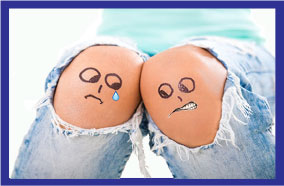Obesity and Arthritis of the Knee

Obesity and Osteoarthritis
We at Active650 are constantly speaking with our customers and take a great interest in listening to their needs. We know that people in the real world don’t all look like something out of ‘Hello’ magazine and many people tell us that they are “a bit heavier than they would like”, have “put on a few pounds”, or are sometimes very frank about the fact that they have “fat legs”. As a company that caters for all shapes, sizes and levels of activity, this got us thinking about the links between obesity and knee osteoarthritis (OA), and how our Knee Support can play a role in helping.


Studies have shown an association between being obese and knee OA1. However, this link is two-fold in that increased weight leads to an increased chance of developing knee OA and, increased weight leads to worsening pain and disability with those who already have knee OA2. Obese females have nearly 4 times the risk of developing knee OA and for obese males the risk is nearly 5 times greater than that for those with a BMI of less than 263. It is perhaps logical to assume that weight gain would adversely affect weight-bearing joints such as the knee, especially when you consider that 1lb extra weight is said to equate to 4-6lbs extra pressure at the knee. As OA is a degenerative disease, this extra pressure creates a significant increase in wear and tear of the cartilage. In fact, obesity has been described as being the “primary risk factor” of knee OA4. This is clearly not good news, given that the majority of the UK population are now either overweight or obese.
What can be done?
The 2 most effective strategies in preventing and managing knee OA are: 1) weight loss, and 2) increased physical activity. In the management of knee OA weight loss alone is not as effective as the combination of weight loss and increased activity5. It is also safe to say that weight loss itself, is easier to attain when physical activity compliments dietary changes.


Whilst weight loss alone may not be as effective as a combined approach, it is still an effective way to reduce the risk of developing knee OA and reduce the symptoms of knee OA. It is however, a lot easier said than done. With the addictive nature of sugary junk food and the persuasive influence of the food industry’s marketing, not to mention the lack of availability of healthy, fresh food, losing weight and keeping it off can be extremely difficult. An increase in activity can help with both the physical and mental aspects of dealing with knee OA and weight control. It is worth noting that preventing weight gain (i.e. maintaining your current weight) is often a worthwhile goal to start with and can slow the worsening of knee OA symptoms when combined with an increase in activity.
Many people we speak to state how difficult it is to increase activity when they have knee OA and the associated levels of pain. This is understandable and it is worth pointing out at this stage that an increase in activity that is too high in intensity may actually put too much stress on the joint and cause damage, thus exacerbating the symptoms.

How to increase activity?
The best advice when looking to increase activity, in order to manage knee OA, is to take things slowly, setting realistic, achievable goals. Choosing activities that put minimum loads on the knee, such as swimming, recumbent exercise bike, elliptical trainer, etc., are best. Use low to moderate intensity when starting a programme and never try to do too much too soon. There are many fitness and health professionals who can advise you on suitable exercise programmes and will be able to personalise a programme for you that won’t result in you having to clad yourself from head to toe in Lycra and head down to your local gym (although that could always be an option if you’d prefer it).
The good news and bad news
The bad news is that knee OA is degenerative and therefore the damage is already done. There is no amount of weight loss or activity that can reverse this damage. The good news is that increased activity has been shown to alleviate the pain of knee OA, allows greater function of the joint, slows further degeneration and allows muscle strengthening. In a nutshell: you can decrease your pain and improve your movement with increased activity5.

How can the Active650 Knee Support help my fat legs?
We know that if your knee hurts, it will be difficult to motivate yourself to exercise and even harder to actually do the exercise. However, we want to give you the best chance possible to be able to increase your activity and experience the benefits that this can bring. It is often the case with obesity that muscle mass decreases and with this loss of muscle comes a reduction in the shock-absorbing potential of the joint4. An Active650 Knee Support holds the soft tissue around the knee joint and helps dramatically with shock absorption. This, in turn, reduces the stresses and irritations that act on the joint to cause pain where the cartilage is damaged.
Our larger supports are specifically designed to fit the larger leg without causing restriction or slipping down. The contoured fit is super comfortable and can therefore be worn for longer periods. Our customers are continually telling us that the pain relief they get from an Active650 Knee Support allows them to return to activities that their knee pain had prevented them from doing.


The Active650 Full Knee Supports are not a miracle cure, but they can certainly help to reverse the slow deterioration of knee OA symptoms by allowing you to return to and increase your levels of activity.
1 Mehrotra C, Naimi TS, Serdula M, et al. Arthritis, body mass index, and professional advice to lose weight: implications for clinical medicine and public health. Am J Prev Med. 2004;27:16-21
2 Nevitt MC. Obesity outcomes in disease management: clinical outcomes for osteoarthritis. Obes Res. 2002;10(suppl 1):33S-37S
3 Anderson J, Felson DT: Factors associated with osteoarthritis of the knee in the First National Health and Nutrition Examination (HANES I). Am.J.Epidemiol. 1988;128:179-189
4 Sowers MR, Karvonen-Gutierrez CA: The Evolving Role of Obesity in Knee Osteoarthritis. Curr. Opin. Rheumatol. 2010 Sep; 22(5): 533-537
5 Messier SP, Loeser RF, Miller GD, et al. Exercise and dietary weight loss in overweight and obese older adults with knee osteoarthritis: the Arthritis, Diet, and Activity Promotion Trial. Arthritis Rheum. 2004;50:1501-1510
6 Minor MA. Impact of exercise on osteoarthritis outcomes. J Rheumatol Suppl. 2004;70:81-86




